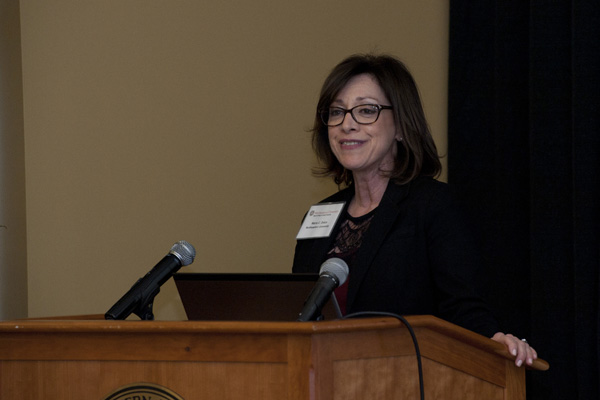Initiative targets national model for oral health

Earlier this week, more than 100 members of the local and national healthcare community convened at the Cabral Center to kick off a Northeastern-based initiative aimed at integrating oral health into overall healthcare education and practice.
“The bottom line is that oral health is connected to overall health, and you can’t address those separately without risking serious consequences,” said the event’s keynote speaker John Auerbach, Distinguished Professor of Practice at the Bouvé College of Health Science and Director of Northeastern’s Institute on Urban Health Research and Practice.
Each year, the United States spends about $120 billion on dental health services, Auerbach said. But this only reflects the direct cost of oral health; indirect costs of untreated dental disease are far greater. “If you ignore oral health,” he said, “you end up paying for it later.”
In order to address this fissure in overall healthcare, associate professor of nursing Maria Dolce is spearheading the new initiative, titled Innovations in Interprofessional Oral Health Care: Technology, Instruction, Practice, Service. Backed by funding from the DentaQuest Foundation, the charitable arm of the nation’s third largest dental benefits administrator, TIPS aims to establish a national model for healthcare education and practice in the Boston area.
“Our mission is to advance interprofessional research education and practice in oral health,” Dolce said. “Our vision is a health professions workforce with the team-based competencies to work, lead, and innovate together to improve oral health outcomes, experiences, and access.”
Terry Fulmer, dean of the Bouvé College of Health Sciences, challenged health leaders in attendance to think about ways to drive change and innovation in the area of oral healthcare. “This is a tipping-point moment, and we can do this,” said Fulmer, who is a member of the Institute of Medicine and a nationally recognized expert in geriatrics.

Following the speakers’ remarks, audience members were invited to share their collective wisdom on how to make the interprofessional oral healthcare vision a reality. Photo by Casey Bayer.
Auerbach noted that oral health is not a standard part of a well-child’s visit to the pediatrician or a pregnant woman’s visit to the obstetrician despite the fact that dental disease is among the most prevalent yet preventable conditions affecting our nation. Nor is it a regular consideration in the treatment of patients with diabetes, HIV/AIDS, or cardiovascular disease—all of which are deeply affected by oral health.
Massachusetts, however, leads the nation in the number of adults who say they visited the dentist in the last year, according to Auerbach, who previously served as the Commissioner of Public Health in Massachusetts and the executive director of the Boston Public Health Commission during the development of Massachusetts’s ground breaking healthcare reform legislation, which is now being emulated on the national level.
Catherine Hayes, president of the American Association of Public Health Dentistry, agreed that Massachusetts has the opportunity to take the national lead on an important healthcare issue. “There’s lots of opportunity to understand how we can make it better, but now the time is certainly here to hit the ground and make this happen,” Hayes said, pointing to Dolce’s leadership and the TIPS initiative as a driving force behind the change.
Ralph Fuccillo, chief mission officer of DentaQuest and president of the DentaQuest Foundation, said, “The real story is the way we interact to get those outcomes that we all believe in.”





